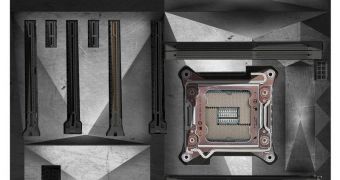Intel's next-generation series of central processing units, codenamed Haswell, is bound to be a boon for Intel's finances but a doom bringer for makers of desktop PC motherboards.
At first glance, the above statement doesn't make much sense. By all accounts, a new desktop CPU is cause for a great new wave of mainboards to be released.
Thus, developers of such platforms should only have to gain from the arrival of the 2012 Core Series CPUs.
Unfortunately, Intel's progress might have a nasty effect on some second-tier makers of motherboards.
Haswell will integrate more functions normally found in mainboard chipsets. It will be closer to an SoC (system-on-chip) than a CPU (central processing unit).
The downside is that platform makers will be left with fewer features to differentiate their products from those of rivals.
High-tier players, like Gigabyte, ASUS, MSI, at least have UEFI BIOS firmware features, Military Class / Ultra Durable components, Wi-Fi, and USB / Thunderbolt interfaces to play with. Thus, they should be safe for a few years yet, even if they need to bet on the high-end and upper mainstream performance markets more than ever.
Companies that make “normal” boards, lacking these things, don't really have much else to keep them in the race, leading to the fears that the market segment will become less populated by the end of 2013.
On that note, Advanced Micro Devices may contribute to this phenomenon whether it likes it or not, since Trinity and its successors will follow a similar pattern of integration, albeit focused around graphics.
Coupled with the impending doom of low- and mid-end graphics adapter, and the odds of next-generation ultrabooks stealing the market share from normal notebooks, this is all building towards a fundamental reorganization of the consumer PC industry. The transformation should be done in 3 to 5 years.

 14 DAY TRIAL //
14 DAY TRIAL //